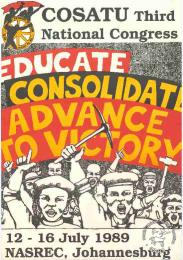May Day, also known as International Workers' Day, has come to represent the struggle of the international labour movement to achieve workers' rights. South Africa has a history of strong labour unions that would fight for these rights.

We are seeing firsthand the strength of this legacy in the form of the bus drivers unions calling for a nationwide strike. This strike has affected a large number of people in their daily commute to work. This strike has been given the support of the Congress of South African Trade Unions (COSATU). The five stakeholder unions for this strike, include South African Transport and Allied Workers Union (Satawu), National Union of Metalworkers of South Africa (Numsa), the Transport and Allied Workers Union of South Africa (Tawusa), the Transport and Omnibus Workers Union (Towu), and the Transport and Services Workers Union (Taswu). The roots of these unions are from the establishment of organised workers unions under the apartheid regime.
On December 1, 1985, COSATU the largest federation of trade unions in South Africa, was formed. COSATU also recognised that it had a political role to play. At the launch, COSATU decided not to affiliate to any one political organisation but rather chose to engage in political struggles through alliances with community organisations, the civics and other progressive movements. COSATU adopted the Freedom Charter as its guiding document.
During the 1980s, the trade union movement had also supported the many consumer boycotts that took place. There were a range of boycotts and solidarity strike actions such as the meat boycotts,Wilson-Rowntree, Fattis and Monis and Simba boycotts. Boycotts proved to be a powerful source resistance in areas where community organisation was strong. This worked both ways. When the unions called on the community to support boycotts relating to trade union resistance, the community came out in wide support.
Repression played an important role in determining the political role played by the trade union movement. In 1988 the government banned the UDF and other civic and youth organisations. However, the trade unions were not banned; their activities were strictly curtailed by the state. Although COSATU was warned to stick to trade union matters exclusively, the trade unions moved into this political vacuum that had been created. Many trade union officials moved into leadership position and COSATU acted as a coordinating body to mobilise protests and to organise a strong alliance of anti-apartheid forces. It was thus the trade union movement that kept the momentum of struggle going at this point.
 On 5 and 6 September 1989, South Africa experienced one of the biggest stay-aways in its history. Over three million workers, which is more than the number of voters in the white elections, heeded the call for two days of protest.
On 5 and 6 September 1989, South Africa experienced one of the biggest stay-aways in its history. Over three million workers, which is more than the number of voters in the white elections, heeded the call for two days of protest.
Production in many centres was brought to a complete standstill. The protest was part of a sustained campaign against the Labour Relations Act (LRA), and was called for by COSATU and the National Council of Trade Unions (NACTU) and a number of independent unions.
There can be no doubt that workers played a significant role in bringing about the end of apartheid. In the late 1980s, COSATU emerged as a driving force in the mass protests that rocked the country. During the 20th century, the trade union movement had come a long way, in fighting for workers’ rights, in forging unity between the different trade union groupings, and in challenging the apartheid regime.
Have these achievements been sustained in the 21st century? The trade union movement was weakened when the country moved towards democracy. Many of the leaders in the union movement abandoned the trade unions and took up positions in government. With COSATU in an alliance with the government, one must question how effective it is as a trade union federation which often has to challenge conditions in the public sector. Cracks in unity are also beginning to emerge as NUMSA talks about breaking away and the giant mining union, NUM is ruptured by a breakaway union. If one is to sustain a strong trade union movement in South Africa, these issues need to be addressed.
The history of the labour movement in South Africa is a long one and is not limited to just COSATU. For more information on this see the SAHA virtual exhibition for more information on the nuances of this history.










